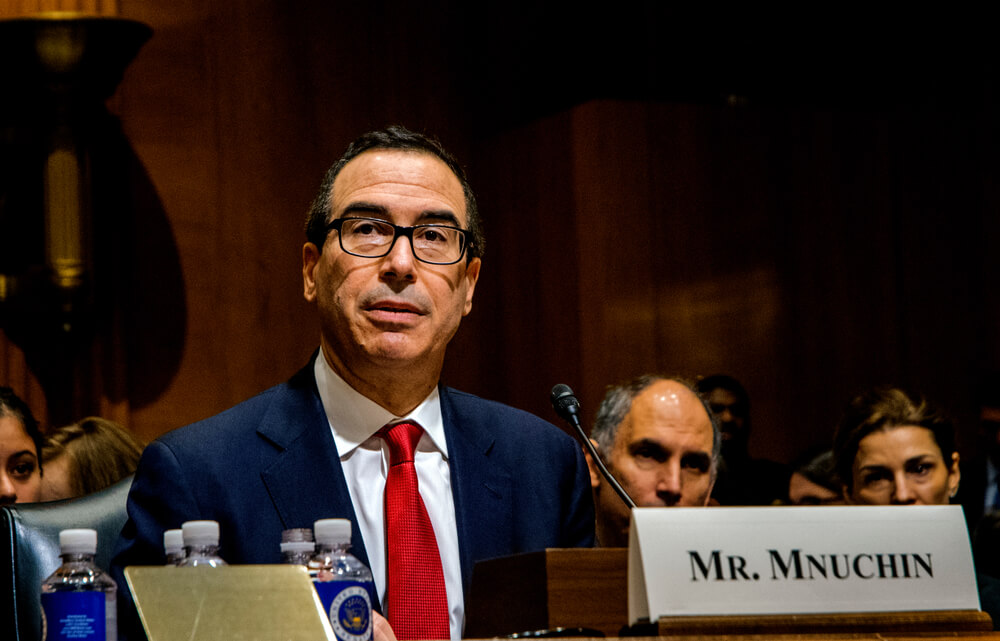It’s House Speaker Nancy Pelosi and top Senate Republican Mitch McConnell vs. hardliners in the White House as lawmakers pursue a deal on federal spending and the debt. And the hardliners, wary of further increases to federal spending, appear to be losing.
Talks between Pelosi and Treasury Secretary Steven Mnuchin appear to be progressing. Mnuchin on Monday told reporters, “I think we’re very close to a deal,” though he cautioned that “these deals are complicated.”
Mnuchin says increasing the $22 trillion debt limit needs to be done this month to avert any risk of a U.S. default on obligations like bond payments. He said he doesn’t think there will be a government shutdown when the budget year ends Sept. 30, nor does he think “either party or anybody wants to put the credit of the United States government at risk.”
Previous negotiations toward a budget deal had included White House conservatives like Acting Chief of Staff Mick Mulvaney. But Mnuchin is taking the lead for the administration in the talks with Pelosi, as the speaker doesn’t have a productive relationship with Mulvaney.
Mnuchin and Pelosi spoke again Monday evening.
The talks increasingly hinge on a durable, powerful and familiar political coalition: GOP defense hawks demanding bigger Pentagon budgets and Democrats seeking equal treatment for domestic priorities.
Three previous fiscal deals over the past years, conducted when Democrats were in the House minority, were greased by lawmakers’ appetite for both guns and butter — to the dismay of deficit hawks relegated to Washington’s endangered species list. Now, after winning back the House, Pelosi has greater leverage, especially because of the need to increase the government’s borrowing cap.
“We gave them an obscene amount of money just two years ago,” said Hazen Marshall, a former Senate GOP budget and leadership aide. “And now they want more on top of that. There’s a never-ending desire to keep on ramping it up.”
Lawmakers are negotiating an increase to spending “caps” for federal agency budgets, along with separate must-do legislation to increase the government’s debt limit. The negotiations are opaque, but appear to be guided by the concept of “parity” in spending increases for defense and nondefense agency budgets, based on a public exchange of letters between Mnuchin and Pelosi over the past few days.
The duo of Pelosi, D-Calif., and McConnell, R-Ky., is a partnership of necessity. The two have a chilly but professional relationship and their interests rarely align. But when they team up — as they did on a government spending deal in February — they are virtually unstoppable. Both have long histories with Capitol Hill’s appropriations process, the painstakingly bipartisan and pragmatic job of annually divvying up the one-third of the federal budget allocated by Congress each year.
Pelosi’s mandate is to increase, as much as possible, the portion of the federal pie going to Democratic priorities such as health care, education, housing and the environment.
McConnell played a key behind-the-scenes role in setting up the negotiations and has encouraged Mnuchin’s central role. He wants a deal that would satisfy his defense hawks and his pragmatic-minded power base on the Appropriations Committee. He also knows that the path to a successful deal goes through Pelosi and is likely to include more money than Mulvaney, a former tea party lawmaker, would like.
The alternatives to a deal are distasteful to both sides, and include freezing spending at current levels and operating most of the government essentially on autopilot under a measure known as a continuing resolution. That prospect, talked up behind the scenes by Mulvaney and his allies, is alarming to GOP lawmakers focused on Pentagon policy, who say it would harm military readiness, hurt efforts to relieve procurement shortfalls and scramble long-term Pentagon budget strategies.
The negotiations are closely held but a key concern for Pelosi is getting $22 billion over the next two years to cover the rapidly-growing cost of privately-provided veterans health care. She sent a letter to Mnuchin on Saturday night agreeing with his request to increase the debt limit but pushing for relief for the Veterans Administration’s private health care program, which threatens to squeeze other domestic priorities.
“I wanted to put in writing what our concern was,” Pelosi said Monday. “We have an additional initiative that was added, but you can’t just take it out of other veterans programs or other programs.”
Republicans say those VA costs should be absorbed inside the $600 billion set aside for nondefense agencies.
Pelosi appears to be dropping another demand, a $7 billion carve-out to pay for the U.S. Census.
© The Associated Press. All rights reserved.
